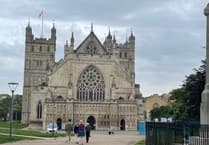CONTROVERSIAL trial changes to residential streets in Heavitree and Heavitree Whipton in Exeter have been agreed despite some concerns.
A number of bollards and planters – or what Devon County Council (DCC) calls “modal filters” – together with gates to allow buses through will be installed to block off some roads to reduce through-traffic and boost cycling and walking.
The trial will be for up to 18 months, as part of a temporary trial agreed by Exeter’s highways and traffic orders committee, while the first six months will be a statutory consultation period for feedback from residents and organisations.
The council has introduced temporary measures previously, only to make them permanent later.
Recommending approval for the Heavitree and Whipton scheme, DCC said it would “improve public health and wellbeing”, but some people are concerned about how much traffic would be pushed onto main roads nearby and increased journey times.
Bus gates will be placed on Ladysmith Road, at the Park Road roundabout, and on Whipton Lane between Whiteway Drive and George’s Close.
They will allow buses, emergency vehicles and, when required, local authority vehicles such as waste collection lorries, to pass while banning other vehicles.
Meanwhile, the “modal filters” will go on St Mark’s Avenue, on the slip road between Ladysmith Road Roundabout and main section of St Mark’s Avenue; on Hamlin Lane, between Wykes Road and Hamlin Gardens; and on Vaughan Road, between Whipton Lane and Vaughan Rise.
The trial scheme follows two rounds of consultations with residents.
The most recent asked for views on four different options for modal filter layouts, but all were more opposed than supported.
As a result, the responses were analysed by council officers and modifications were made to the trial scheme design.
It was backed by a number of public speakers attending the meeting at County Hall in Exeter who supported a reduction in traffic and pollution through Heavitree and Whipton’s residential streets.
But others urged caution about pushing more traffic onto main roads, claiming it would lead to increased congestion and pollution, and lengthen some journeys.
The council’s consultation exercise was also criticised.
However, Jamie Hulland, the council’s senior transport officer, stressed the trial could be abandoned at any point.
The council report added that “ongoing engagement and consultation” to understand its impact.
The committee backed the trial, which will cost up to £190,000 funded by the government.
This includes monitoring its impact on traffic flows.
Committee chair Danny Barnes (Labour, Heavitree and Whipton Barton), said: “More than 2,000 vehicles travel along many of these residential streets every day and this deters local people from cycling or walking.
“We have been engaging with the local people since 2020 and it is clear, from what they have told us, the amount of traffic and the lack of priority for walking and cycling is a concern.”
He added: “By trialling these additional interventions we hope to create a safer and more attractive environment for active travel while ensuring that all properties remain accessible by car.”




